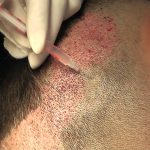
Hormones play a crucial role in regulating hair growth and can significantly impact the results of hair transplant procedures. Fluctuations in hormone levels, such as those experienced during puberty, pregnancy, and menopause, can lead to changes in the thickness and density of hair.
Androgenetic Alopecia
One of the most common hormonal contributors to hair loss is dihydrotestosterone (DHT), a byproduct of testosterone. DHT can shrink hair follicles, leading to a condition known as androgenetic alopecia, or male and female pattern baldness. The presence of DHT in the scalp can interfere with the normal growth cycle of hair, causing miniaturization of hair follicles over time. This gradual process can result in thinner, weaker hair strands that are more prone to shedding, eventually leading to visible hair loss.
Effect on Transplant Results
When considering a hair transplant, hormonal factors must be taken into account to ensure the best possible outcomes. For instance, individuals with hormonal imbalances may not be ideal candidates for transplant surgery, as the underlying hormonal issue can continue to affect the transplanted hair. It is essential for both the patient and the transplant surgeon to assess the individual’s hormonal profile and determine the suitability of the procedure based on these factors. Hormonal imbalances can compromise the success of the transplant by hindering the growth and survival of the transplanted hair follicles, leading to suboptimal results and potential additional hair loss in the future.
Post-Transplant Care
Patients undergoing hair transplant procedures should follow a comprehensive post-operative care plan to support optimal results. This may include hormone-regulating medications or lifestyle changes to maintain a healthy hormonal balance and promote long-term hair growth. In addition to following the specific instructions provided by the transplant surgeon, patients may benefit from incorporating a healthy diet, regular exercise, stress management techniques, and adequate sleep into their routine to support overall hormonal health. Proper post-transplant care is essential for ensuring the success and longevity of the transplant results, as it can help minimize the impact of hormonal fluctuations on the transplanted hair follicles and promote their healthy growth and maintenance.
Jenny Zhang
Jenny holds a Master's degree in psychiatry from the University of Illinois and Bachelors's degree from the University of Texas in nutritional sciences. She works as a dietician for Austin Oaks Hospital in Austin, Texas. Jenney writes content on nutrition and mental health for the Scientific Origin.










